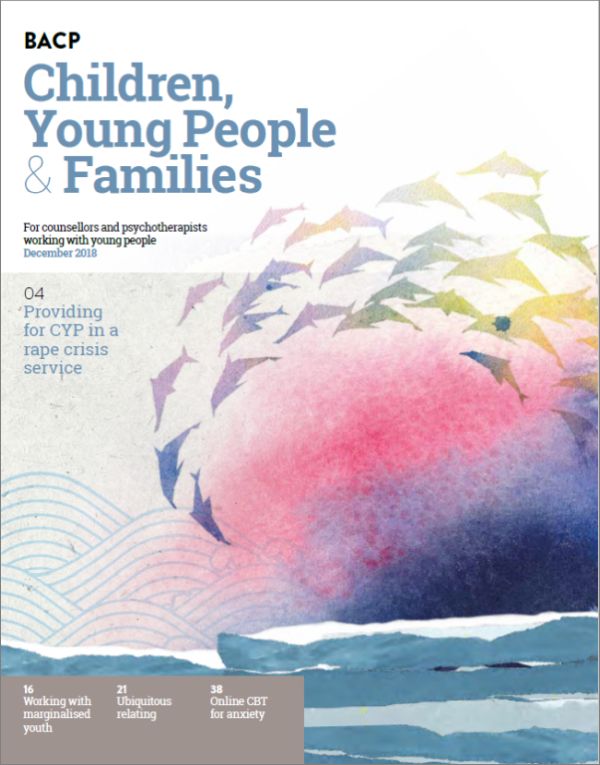In this issue
Features
Providing for ‘dolphins’ (free article)
Jenny Edwards set up a CYP counselling service within a rape crisis centre
Working at the margins
Interview with Richard Carroll about marginalised young people
Failure to launch
Brad Sachs on helping young adults to become unstuck, by sharing the sense of failure
In practice
Online counselling in schools
A group-wide online service is now provided, using the schools’ counsellors. Jeanette Hennigan reports
The missing life skills
Carol Lozier’s practical introduction to dialectical behaviour therapy
Brave-Online
Susan H Spence and colleagues describe the genesis and success of an online cognitive behavioural therapy for anxiety
Issues
GDPR and CYP
Barbara Mitchels and David Membrey explain in detail
Ubiquitous relating
Sarah Haywood continues her mini series around digital childhood
Feeling the feelings
The case for not denying our feelings about clients. By Jeanine Connor
Quack – get out of town
Counselling is the ugly duckling when remuneration is required, says Rachel Eastop
Regulars
Word for word
A practitioner’s personal response to a given quote. This time, Jo North
Reflecting on… swearing in sessions
Jeanine Connor
Thinking about… supervision and the law
Lynn Martin
Considering… the importance of misery
Nick Luxmoore
Resources
Our mini focus on two BACP Good Practice in Action resources

A pdf of this issue is available in the BACP Children, Young People and Families archive
Welcome from the editor
The other day, I was reading a Kindle sample of One of Us is Lying, by Karen McManus. I often read YA novels. I mostly find them more enriching than adult ones. Anyway, because I’d commissioned several pieces for this issue about the onward move into all things computer, the following exchange immediately amused me.
Mr Avery, arriving to supervise detention, says: ‘You’re here until four. I want each of you to write a five-hundred word essay on how technology is ruining American high schools.’ One girl asks what they should write with, given the absence of computers in the room. The teacher taps a notepad and says: ‘Explore the magic of longhand writing.’ ‘But how do we know when we’ve reached five hundred words?’ comes the confused response. ‘Count,’ he says.
Classic. It shows up what’s being lost in a technological age – and, like all humour, it’s geared to the one point to get a laugh. Yet humour misses the genuinely good, beneficial stuff of the smartphone era. Here, in the more serious world of our journal, we have articles on CBT being used effectively online for anxiety; a group of schools running a successful online counselling service in parallel with their respective face-to-face ones (the research leading to this won a BACP award for its author); plus a discussion of the current ethos of ubiquitous online relating and the suggestion that we can harness our knowledge of how relationship building has evolved recently, in order to help our young clients understand this and review their own lives and balances.
Of course, neither humorous quips nor online access will bring a smile to the face of those who’ve been abused sexually. Our lead article is Jenny Edwards’ account of how she has built up a service for under-13s within Kent Rape Crisis Centre’s adult service. I hope it will inspire us to consider what’s possible. Never mind modern technology – I once spent a year manning the evening phone line at a rape crisis centre, so I can imagine the relief for those young people in Kent who can now receive low-tech, face-to-face support to help them recover from their ordeal. I didn’t force Jenny to write 500 words, or even 2,500, and it’s certainly no laughing matter, but it did still bring a satisfied smile to my face on reading it when it was ‘handed in’. This is so exactly what is needed relationally when a poisonous ‘other’ has wrapped themselves round a child.
But here again, funding rears its head – I won’t say ‘ugly head’ because funding is neither bad nor good, merely a reality. However, the future for this children’s service is only secured on a year-by-year basis. How can this be, when governments keep promising more and more help for mental wellness initiatives? What is actually being paid for? Obviously, one chunk, according to the recent Green Paper, is going to the (super-slow and patchy) roll-out of newly trained people in schools, instead of using our already superbly trained pool of therapists. But I can only assume, in the wider arena, that Rachel Eastop’s experience in one area of Scotland, which she eloquently describes here, is probably prevalent in most parts of the UK: we are simply not valued as professionals in our own right and therefore not worth paying. Certainly not up front and long term. Why else would money be spent training people with a new title to do less expertly (based on their lack of experience) what we do so well? This does indeed merit the epithet ‘ugly’. BACP fights our cause constantly, but it seems their reasoned arguments fall on intransigent hearing faculties. Maybe it’s time to pull out our prehistoric pens and write 500 words to those in power, arguing the case in our own words. Because someone is lying about the power of counselling – and it’s not us.
The CYPF conference is on 9 February 2019. I’ll be back in March for my last editorial.
Eleanor Patrick
Editor
